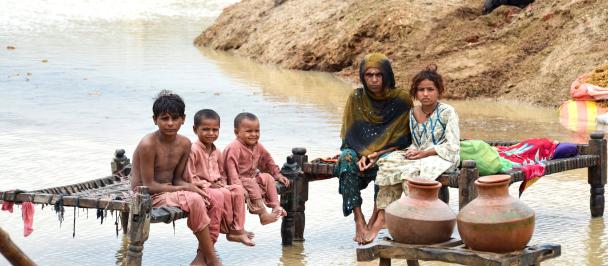Islamabad, 11 March 2021: A set of four trainings on “Disaster Risk Management” (DRM) concluded today in Islamabad, organized by the GLOF-II Project, a joint initiative of Ministry of Climate Change and UNDP. Over 150 government officials and community members from targeted districts and provincial line departments participated in the trainings. The trainings, conducted by DRM experts, from Empowerment thru Creative Integration, were attended by representatives from provincial Disaster Management Authorities, Forest departments, Agriculture Department, Planning and Development Department, Pakistan Metrological Department, Environmental Protection Agencies, and Rural Support Programs.
The main objective of the training was to build the capacities of the participants by improving their skills and knowledge on DRM, with a specific focus on an introduction to all components of community resilience. The content focused on the basic concepts and terminologies related to DRM along with the pro-active implementation of DRM framework, mainstreaming disaster risk reduction into different sectors, outlining policy guidelines for vulnerable groups, integrating gender concerns in disaster planning, response and use of assessment tools i.e., hazard, vulnerability, risk and capacity assessment.

Honorable Chief Minister, Gilgit Baltistan, Muhammad Khalid Khurshid Khan, when attending the closing session, acknowledged Pakistan Metrological Department and GLOF -II Project’s work for their immediate attention towards Shisper Glacier Surge in Hasanabad, Hunza and the completion of the Automated Weather Station installation. He appreciated PMD’s constant monitoring of the situation and expressed the significance of such initiatives for empowering the local community against climate change induced threats.
Chief Secretary, Gilgit Baltistan, Muhammad Khuram Agha thanked all government representatives for their participation and hoped that the sessions had produced productive and insightful discussions and paved way towards ensuring an integrated disaster risk management system for the Northern areas of Pakistan.
Additional Secretary, Ministry of Climate Change, Mr. Joudat Ayaz appreciated the successful completion of the trainings and emphasized on the need for capacity building of provincial governments, line departments, and relevant stakeholders. Assistant Resident Representative, UNDP, Amanullah Khan was also present at the event and appreciated the team on conducting such a fruitful training.
Funded by Green Climate Fund, GLOF-II project aims to empower communities to identify and manage risks associated with GLOFs and related impacts of climate change. It also works to strengthen public services to lower the risk of disasters, and improve community preparedness and disaster response capacities. Trainings like these are an important component of the project in order to build capacities of government departments to tackle climate change induced disasters.
For additional information about UNDP, please contact Ayesha Babar at ayesha.babar@undp.org or +92 (51) 835 5650
* * *
UNDP is the leading United Nations organization fighting to end the injustice of poverty, inequality, and climate change. Working with our broad network of experts and partners in 170 countries, we help nations to build integrated, lasting solutions for people and planet. Learn more at undp.org or follow at @UNDP

 Locations
Locations



